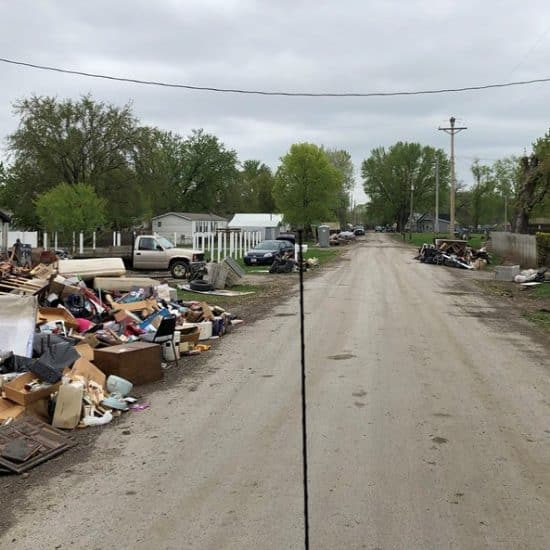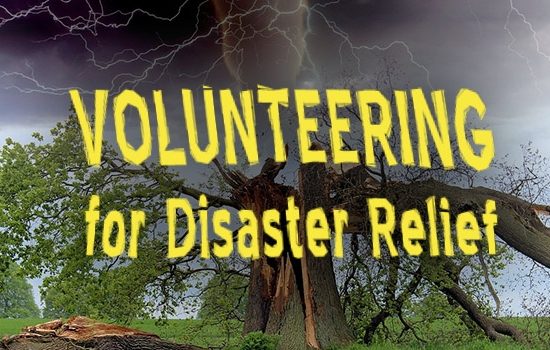The earth and its atmosphere have seemed to flex their muscles in a particularly robust way in recent days, weeks and months. And humankind is hard-pressed to do anything to prevent it.

Bill Webb
|
We've seen earthquakes and tsunamis in Japan. And continuing aftershocks before many in the affected areas could even catch their collective breath.
Within the past couple of weeks, tornadoes and high winds killed dozens in North Carolina and the surrounding area. Miraculously, everyone survived when a large home improvement store groaned as its metal roof was being peeled back and the structure destroyed.
In Missouri less than a week ago, another tornado mowed down homes and businesses in the St. Louis area, literally flattening a whole residential block. When a tornado descended upon St. Louis' Lambert International Airport, massive windows sprayed shards of glass into the concourses, roofs were ripped off and vehicles flew into the air like Matchbook cars.
Miraculously, while a number of people suffered treatable injuries, no one died in this devastating attack in St. Louis.
Continuing rains and thunderstorms are getting in their licks. As this column is being written, about a thousand residents of the southeastern Missouri community of Poplar Bluff have been been evacuate because the swollen Black River is set to overflow the levee. Parts of the lower Mississippi and Ohio River valleys in that part of the state brace for what the National Weather Service says could be record flooding.
Down in the Abilene area of Texas, wildfires have been forcing residents to evacuate in case not only their homes are engulfed by flames but they and their families experience injury or worse.
At times like these, people tend to ask religious questions, most of which begin with why. Some ask, "Why me?" Others deal with guilt from being spared the latest round of threats and/or devastation by asking, "Why not me? Why was I spared?"
Perhaps it is natural to hurl those "whys" heavenward to the one who birthed creation in the first place and demonstrated his mastery of wind and rain and threatening storms.
Devastating funnel clouds and high winds struck St. Louis and some of its collection of communities on Good Friday. Is that why the city apparently escaped fatalities when by all appearances there should have been dozens and dozens of people who perished?
In contrast, why were the twisters out east a couple of weeks ago so deadly, killing men and women, boys and girls? Were those people more deserving of some sort of weather-related punishment?
Many tend to ask, "Where was God when these fearful things were happening?" Such questions usually aren't really questions but pointed (sometimes poisoned) charges aimed at the Almighty.
The folks at a notorious Kansas church are quick to call every natural calamity an act of divine judgment. That approach carries an odor with it: Those who claim God's judgment is the reason almost always see that judgment meted out to others but never applying to themselves.
Interestingly, having a God who more closely resembles Zeus, the Greek thunderbolt-throwing king of the gods, or the Norse god Thor, a hammer-wielding thunderbolt-thrower himself, sounds attractive to some.
It would be nice to have easy answers, and sometimes they are evident. A faulty levee — either poorly designed or constructed — will be more prone to being breeched when uncontrollable rains come.
Buildings constructed in known earthquake-prone areas without the appropriate strength and flexibility to withstand the trembling earth are more likely to fail and result in injury.
But most natural disasters simply come. We really don't know why some people are unaffected and others — often the most innocent among us — bear the brunt of cataclysmic events.
Is it correct to thank God for survival or the escape from injury in the face of natural disasters? Of course. Is it correct to interpret the misfortune of the one who wasn't spared as God's judgment? Surely not, lest we find ourselves playing God.
Better than the "why?" questions are the "what now?" responses. Perhaps God is watching to see who rushes in to lend a hand to a struggling stranger, a neighbor, if you will. Perhaps he notices who handles adversity in such a way as to set an example to others. In such times, who sees and acknowledges the comforting hand of God?
Some things we simply can't know and we shouldn't pretend we do. But in inexplicable times of crisis — natural or man-induced — we can seek out God for our own comfort and security. And we can reach out in God's name to bring similar hope to those who didn't fare well.
Many in the faith community are among the first to join God in the wake of a natural catastrophe to aid those in need. Save the questions. Concrete, compassionate response is best.
Bill Webb is editor of Word&Way.


